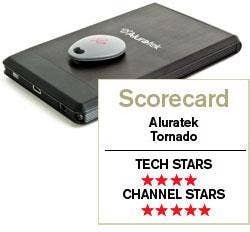Review: Secure Storage, The RFID Way
It's not only customer confidence that potentially could be destroyed if an absent-minded employee leaves his laptop in the back of a cab—a laptop, say, with critical customer or company data. Compliance regulations across health care, finance and, with PCI issues, the retail sector, mean that even a $17-an-hour account associate can cost a company millions of dollars as well as its reputation with lost data.

Largely because of these concerns, not to mention the lowering cost of deploying better encryption technology, hard disk drive makers are coming to the market with solutions to batten down the hatches. Aluratek Inc., an Irvine, Calif.-based maker of RFID-based storage encryption and other solutions, hit the market earlier this year with one of the more effective approaches the Test Center has seen, with the Aluratek Tornado Plus 2.5-inch USB 2.0 External SATA hard drive with key recognition security. Aluratek also makes retail products such as digital photo frames and Internet radios, in addition to its line of compact storage devices.
The Aluratek Tornado arrived at the Test Center lab accompanied by a Western Digital 250-GB Scorpio drive; the package even includes a screwdriver to swap different drives in and out of the enclosure—which means the encryption solution that the company provides can be scaled up to more 2.5-inch drives as, for example, capacities increase and prices decline.
The RFID security built into the iPhone-size enclosure is a step beyond other drives like Western Digital's Passport drive. The Passport provides password-based encryption in a USB-connected drive that can scale up to 320 GB of capacity.
Western Digital's Passport is a nice fit in the retail space for personal data protection, but for information as important as customer data, the Aluratek Tornado provides an additional layer of comfort.
The case comes with two RFID keys that resemble tags you'd see on a keychain. Simply by swiping those tags over a sensor that's built into the enclosure, the drive can be locked or unlocked.
The Tornado, which is built with 480-Mbps USB 2.0 transfer speeds, doesn't need external AC power adapters. Two USB power connections will do the job just fine. Even with its high-tech security, the Tornado is backward-compatible with USB 1.1. Tornado supports up to 250-GB, 2.5-inch hard drives in its enclosure, so there's plenty of room for mobile professionals who must carry music and video files along with corporate data files.
Even with its high-tech encryption, setup was easy. Five steps and you're done with RFID. Plug-and-play takes over the rest. Users will need to format and partition the drive on Windows XP or Vista once the drive is discovered.
At just more than $100, the Tornado is quite reasonably priced considering the powerful RFID encryption technology built into its electronics.
The company says that its motto is "simple elegance." Its RFID drive, with a smooth and slick, black metallic case, certainly backs up that statement. The real test for solution providers, though, is whether it can protect a certain level of sensitive data against theft or loss. Would it be recommended to store a 50-GB database of customer names and Social Security numbers during an employee's business trip? That depends. If it was a company you owned, would you want to sleep at night?
The Bottom Line More and more creativity will be needed to deliver affordable solutions to small and midmarket businesses so they can stay in the good graces of IT compliance regulations without taking a massive hit in a challenged economy. For some businesses, the cost of coming into compliance could be a make-or-break issue. While the Test Center continues to urge solution providers to be very careful about matching client-security solutions with enterprises to deal with security and regulation, the Aluratek Tornado is a low-risk investment that could navigate some businesses through a risky environment. It's also a nice way for solution providers to get customers thinking about new approaches to security, and an inexpensive way to begin introducing RFID into the IT equation.